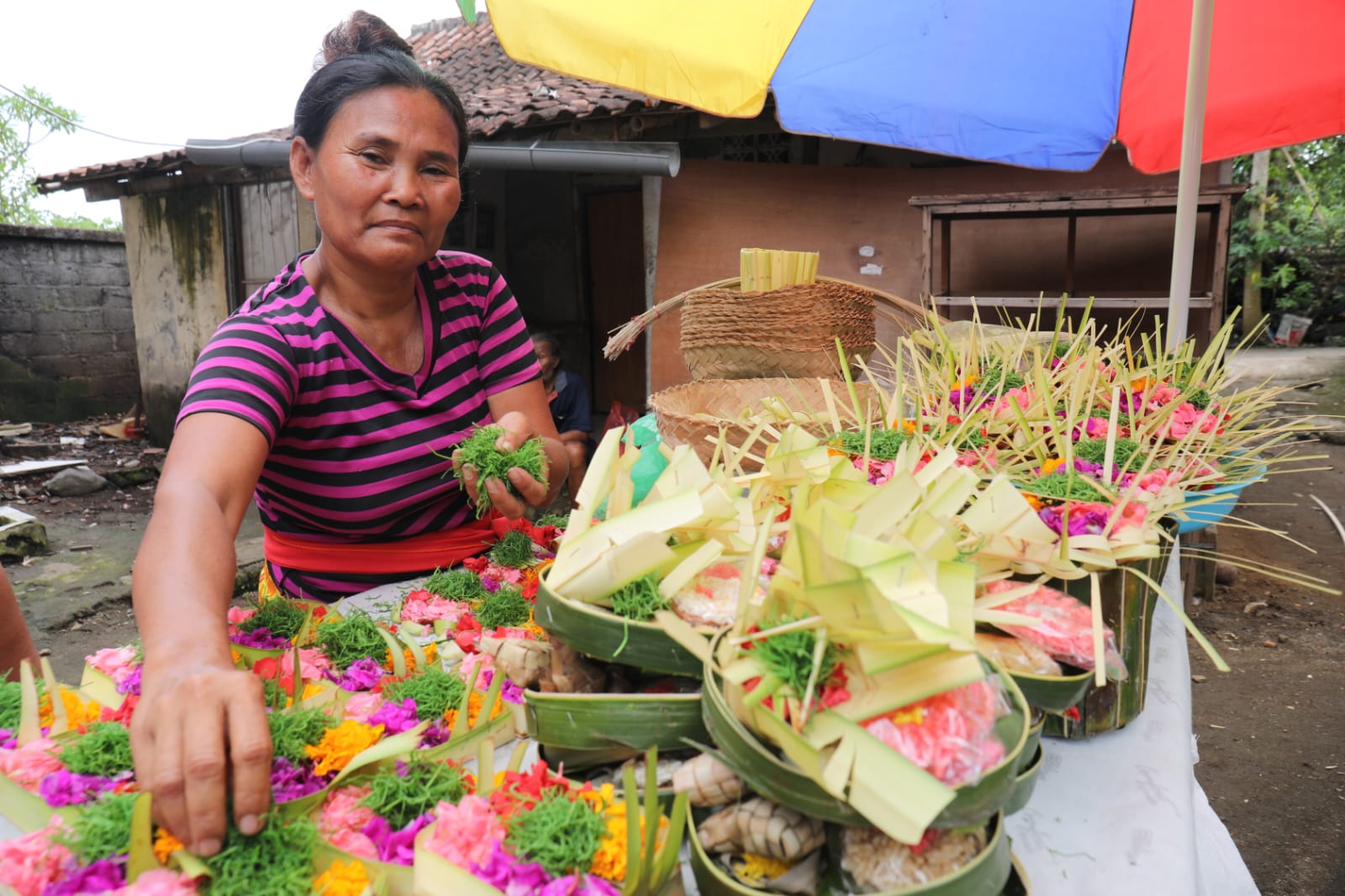PENA Assistance from MoSA Boosts Turnover of Carving Craftsmen and Canang Pejati Sellers in Klungkung

Writer :
Indah Octavia Putri
Translator :
Intan Qonita N
Editor :
Karlina Irsalyana
KLUNGKUNG (April 24, 2023) - The Ministry of Social Affairs' assistance greatly supports the efforts of I Putu Dedy Aryawan. The turnover of the woodcarver in Klungkung is now continuing to increase.
Through the Nusantara Economic Heroes (PENA) program developed by the Minister of Social Affairs Tri Rismaharini, the 43-year-old man received equipment assistance e.g. jigsaw machine, drill, and carving knife. With this equipment, Dedy can complete his series of jobs independently.
"In the past, I had to hand over this to other people because I didn't have the tools. It took time and hampered the work because I had to queue. Transportation costs were also needed, and the results obtained were not as expected. Not to mention the Covid 19 pandemic also added to the burden," said Dedy.
Thanks to the assistance of the Ministry of Social Affairs, Dedy's work is now running smoothly. The turnover of woodcarving work per day reaches IDR75,000 - IDR100,000. If it's busy, the turnover can be even bigger.
"The selling price of the carvings depends on the details, the simpler the carvings, the cheaper the price," Dedy said. Wood carvings range from IDR250,000 to IDR300,000, that's for the cost of the carvings only, excluding the painting service.
"The most difficult wood carving motif is the single petruk motif," said a resident of Baleagung Hamlet, Bungbungan Village, Banjarangkan District, Klungkung Regency, Bali Province.
Dedy makes wood carvings based on orders. Usually, the wood carvings are used for temples, houses, and others. The customer is providing the wood, and Dedy's job is to craft the carving motif.
The making of the wood carvings is also done by himself, designed by himself, with a processing time of around 1.5 - 3 days depending on the size of the wood and the carving motif made.
Dedy got his wood carving skills from self-taught learning; besides it is a hereditary tradition because Bungbungan Village is famous for its carvings.
Dedy has been a wood carving craftsman since 2012. In the past, Dedy used to handle his orders at different locations, namely in Jehem Village, besides Bungbungan Village. The carving-making process, explained by Dedy, is by drawing the motif first, then making holes with a gijig machine. After the wood carving is finished, the product is delivered to the buyer.
Besides Dedy, the next beneficiary of the PENA program is Nengah Suyasa. This resident of Semarapura Tengah Village, Klungkung Regency has felt the benefits of PENA assistance.
Before receiving assistance from the Ministry of Social Affairs, Suyasa's income was uncertain depending on customer orders and Hindu religious holidays. He said, that in the past his daily turnover was IDR50,000, even when orders were not much, he only got IDR25,000. During Hindu holidays, Suyasa can bring home IDR75,000 - IDR100,000.
However, with the assistance of PENA, daily sales turnover can reach IDR75,000 on weekdays and IDR100,000 - IDR150,000 on Hindu holidays. "I can also make better and more canang pejati (after receiving PENA assistance)," said Suyasa.
The 67-year-old man started his business in 2009. Suyasa sells crafts in the form of canang worth IDR45,000 (co 3 packages) and pejati worth IDR22,000 per piece. This price is also adjusted to the market price. Canang Pejati is made by Suyasa based on orders from customers and is made 10 pieces per day, sometimes reaching 15 pieces, and often reaching 25 pieces.
Every day Suyasa sells Canang Pejati at the market from 04.00 to 13.00 and continues in the afternoon selling in front of the house. Canang Pejati is made every day routinely, but if it is for orders, the making is different. The amount also varies between 50-100 packages. Canang Pejati is made by Suyasa at home assisted by his children and wife.
"Canang Pejati is made every day because it cannot be stocked, it must be fresh, and the ingredients are easily wilted. The ingredients used include duck eggs, rice, rengginang, ketupat, tumpeng, pandan leaves, frangipani flowers, henna flowers, gumitir flowers, kenanga flowers, kembang seribu flowers, oranges, bananas, etc.," Suyasa said.
PENA is an empowerment program for underprivileged families adopted from the Nusantara Economic Heroes program when Minister of Social Affairs Tri Rismaharini served as Mayor of Surabaya.
Public Relations Bureau
Ministry of Social Affairs of the Republic of Indonesia
Share :
 English
English
 Bahasa
Bahasa
